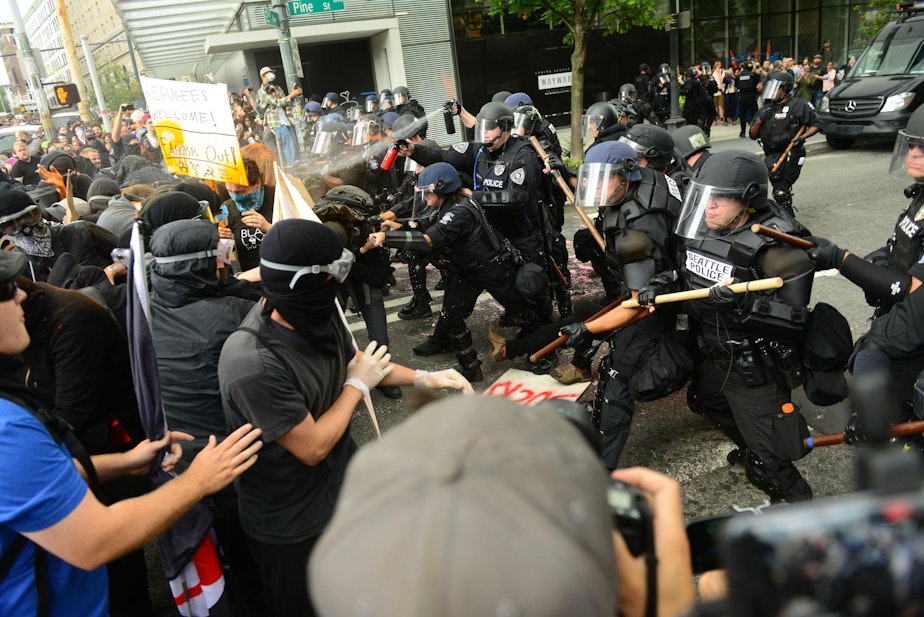How should we respond to white nationalist protest?

"What surprises me is, quite frankly, the outrage of our white progressives who continue to be surprised. For people of color, this is our life every day."
Bill Radke speaks with University of Washington political science professor Christopher Parker and Pastor Priscilla Paris Austin of Immanuel Lutheran Church in South Lake Union about their reaction to the white nationalist protests in Charlottesville, Virginia and similar protests here in Seattle over the weekend.
Were you surprised by the events in Charlottesville and Seattle?
Christopher Parker: Not in the least. What surprises me is, quite frankly, the outrage of our white progressives who continue to be surprised. For people of color, this is our life every day.
It outrages me that it takes this much to get white progressives to finally see that there's something really wrong and amiss in this country.
On President Trump’s response:
Parker: Most of the time people's first response is their most sincere response. The fact that it took him two days to get his act together suggests that he was pressured by Republican [Senator] Orrin Hatch and other party members coming out and saying these are not consistent with the values on which America was based.
Not naming the Klan or white nationalists, Trump — I'm not going to call him President, forget that — even though Trump called out President Obama every time he got a chance to do so for not naming radical “Islamic terrorism.” I mean, come on. How much of this are we going to put up with as a country?
On whether counter-protest works:
Pastor Priscilla Paris Austin: The point of the counter protest is to help people see that there is a better way; that there is greater love; that there is enough love; that there are enough resources; that there is enough for everyone. And we don't have to be at each other's throats. I absolutely believe that there is space and there is enough love for everybody.
And you know, I'm not deluded. I am a woman of color and I am not surprised that any of these things are happening. But I think that there's a different way to approach it.
What is the best response?
Parker: This cannot go uncontested and unchallenged. I just have a hard time believing that turning the other cheek is the right course right now. I think in theory that works, but in practice I just have a hard time believing that.
So you had the Martin Luther King, Jr. wing of the Civil Rights movement and then you had the Malcolm [X] wing. And the Martin wing, you know the sort of Gandhian approach of passive resistance, that worked out because white folks did not want to have to deal with the alternative.
Austin: Friends of mine marched in Charlottesville and they were clergy and they were part of that counter-protest and the anarchists. When white supremacists and the neo-Nazis began to try and attack the clergy, it was the anarchists who protected them. It was their partnership that made it possible for the governor and for the mayor to make statements of strong repudiation.
I don't want to just turn the cheek but at some point somebody has to stop the violence.
A listener told KUOW he thinks we should ignore white supremacist protests and “let them yell at the moon.” Agree?
Parker: No way. This sort of intolerance needs to be contested. You just cannot let it run rampant. And I say that for at least two reasons, the first of which is: Protest is American as apple pie, if you will.
Beyond that, think about what's happening with Trump right now. Why are we so polarized? It's difficult to really hide that this country remains a racist, sexist, homophobic, xenophobic country. You know why? Because we have the biggest one in the White House right now.
This country has not been this polarized since the Civil War. So I would say that this kind of intolerance needs to be checked. It needs to be confronted to also give some hope to like-minded people.
Austin: For the entirety of the Obama presidency, we had a whole bunch of progressive and liberal white folks who felt that "everything was all good now, racism is fixed and we are now a united people."
I wish that that were true. I wish that we could just turn our backs on them and let that sort of starve them out. But the truth is: They're scared. They are frightened and fear yields really scary results.
People do scary things when they are afraid and they will do things, without being countered, that will become even more harmful. So we have to respond in some way.
Responses have been edited for length.
Produced for the Web by Bond Huberman.


